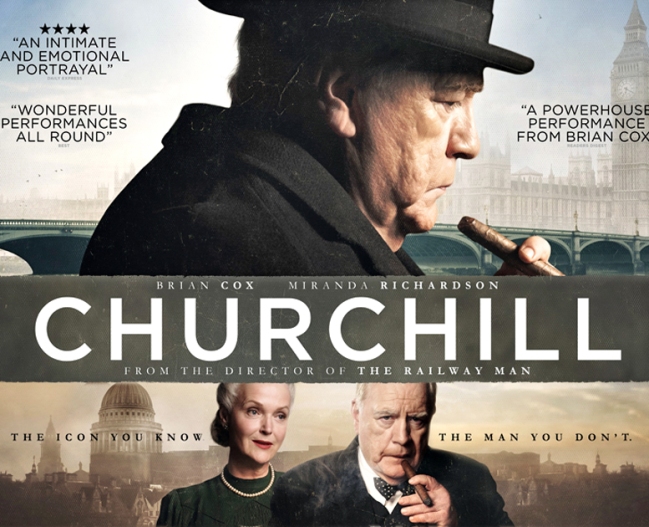 June
22
June
22
Tags
Churchill (2017)

While historians debate facts audiences judge movies on expressive qualities, human insight and entertainment value. The beautifully produced Churchill (2017) is being criticised for its interpretation of history, leaving the film’s considerable cinematic qualities overlooked. Historical bio-pics are necessarily selective and reductive, and many are less than complimentary when heroic icons like Winston Churchill are put under the cinematic microscope.
The opening scenes set the background for this version of the Churchill legend. Alone on a sweeping beach in June 1944, Churchill (Brian Cox) is deeply troubled by Allied Command plans to launch a massive military force onto the beaches of Normandy. It is a high-risk strategy to drive the Nazis out of France and turn the tide of the war. He watches the incoming waves, seeing them turn the colour of blood. The screen then turns to black and white as he walks across the beach that has suddenly turned into a battlefield strewn with the fallen of the First World War. Although ham-fisted, this imagery quickly sets the context of Churchill’s state of mind: the haunting fears and failures of the disastrous 1915 Gallipoli Campaign. The rest of the film examines the political machinations of Churchill, Eisenhower and Montgomery during the frenetic six days leading to the landing at Normandy. Throughout this critical period, the chain-smoking Churchill is shown as suffering from depression, alcoholism and the tensions of a long-strained marriage.
Like in many historical dramas, a young love story is incorporated to offset the imposing and cantankerous Churchill. But it is neither significant nor distracting. The entire impact of this film rests on Brian Cox’s interpretation of the man still most revered by Britain. A spent-looking 70-year old, he is portrayed as a man still fighting the last war and ill-suited for military strategy in 1944. Both the British and American high commanders show little respect or tolerance for Churchill’s meddling in the invasion plans, and even King George VI countermands his plan to be on board a naval ship close to the battle. His ever-patient wife Clementine (Miranda Richardson) was more nurse than companion as she used all her influence in focusing Churchill on what he did best: inspire the nation with a Prime Ministerial speech that remains a classic in poetically pugnacious war rhetoric.
The small six-day window of history through which this film peers means that the story is compressed into an unsubtle and limited character study of Churchill and his relationship with Clementine. While the support cast are excellent, the performances by Cox and Richardson are outstanding and their synergy extraordinary. If there is a higher-order message in the film it may be that greatness and vulnerability can co-exist in equal measure: even the most inspiring leaders suffer the frailties of being human. Historians have every right to point and sneer, but this film should be judged as cinema, not history. And it is fine cinema indeed.

Director: Jonathan Teplitzky
Stars: Brian Cox, Miranda Richardson, John Slattery

Excellent review!
LikeLiked by 1 person
Thanks for your kind comment Eric.
LikeLiked by 1 person
Three cheers to Brian Cox for taking on this legend. Glad to hear you liked it–you’ve been reviewing a lot of WWII films lately, yes?
LikeLiked by 1 person
Good to hear from you Cindy. There has been a spate of well-made WW-era films of late that demand viewing and commentary.
LikeLiked by 1 person
You do it very well. 🙂
LikeLiked by 1 person
On my list to see. Of course your reviews lure me to movies like the scent of pollen lures bees!
LikeLiked by 2 people
What a delightful thought. Hope you enjoy it.
LikeLike
Pingback: Churchill (2017) | CineMuseFilms | Rogues & Vagabonds
Fantastic review and I find it awesome that you choose to do historical movies too, because I feel like this genre doesn’t get as much attention as it deserves.
LikeLiked by 1 person
A good historical movie is not just entertainent but an important cultural artefact that informs and enlightens. I love ’em.
LikeLiked by 1 person
I couldn’t agree more!
LikeLiked by 1 person
Pingback: Favourites 2017 | CineMuseFilms
Pingback: Darkest Hour (2017) | CineMuseFilms
I missed that one. Oh well will see it on DVD
LikeLiked by 1 person
If you watch Darkest Hour, Churchill and Dunkirk, you will be an expert on this era in history. They dovetail beautifully.
LikeLiked by 1 person
Cool we’ll do. Thank you.
LikeLiked by 1 person